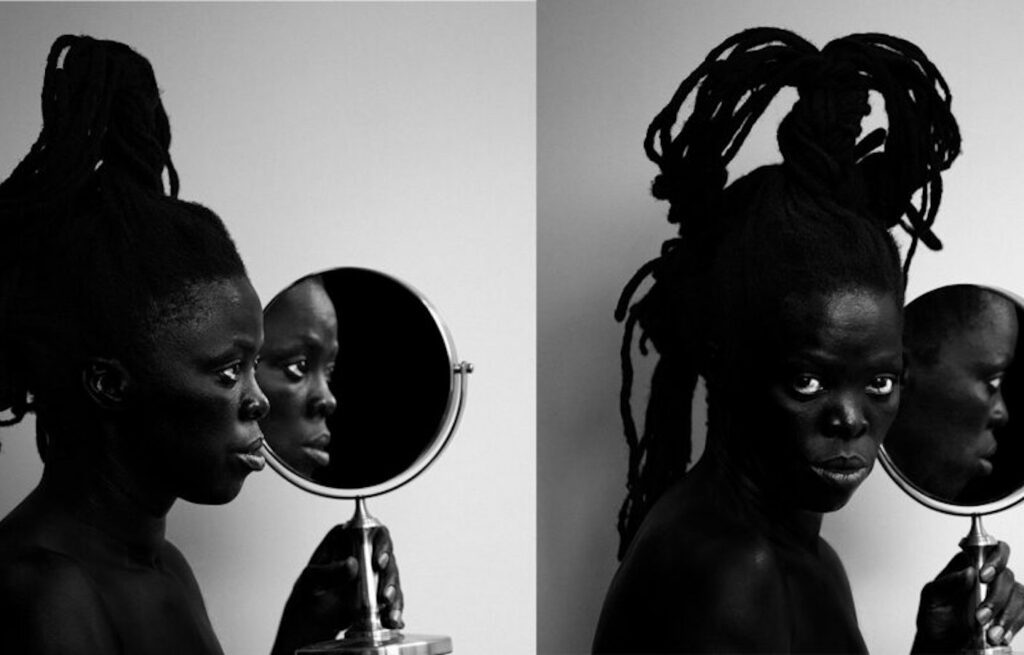San Francisco Museum of Modern Art (SFMOMA), San Francisco, United States
18 Jan 2024 - 11 Aug 2024

Zanele Muholi, Zazi I & II, Boston (detail), 2019; Bader + Simon Collection; © Zanele Muholi
The San Francisco Museum of Modern Art (SFMOMA) announces the first major exhibition on the West Coast of South African artist Zanele Muholi. On view at SFMOMA from January 18–August 11, 2024, Zanele Muholi: Eye Me brings together over 100 of the artist’s photographs from 2002 to the present alongside paintings, sculpture and video. The exhibition provides an opportunity for audiences to experience Muholi’s expansive artistic project to celebrate and make visible their Black queer community in post-Apartheid South Africa.
A self-described visual activist, Zanele Muholi (pronouns: they/them) foregrounds issues of gender identity, representation and race in their work. Muholi’s project as both an artist and an activist includes making space for Black queer life in the museum. For Muholi, photography is a formidable tool for resistance and social change. From their early work contending with the dangers of being queer in South Africa to more recent work embracing their own Blackness and gender expression, activism is central to Muholi’s artistic practice.
Whether photographing their own body or members of their LGBTQ+ community in South Africa, Muholi’s work calls attention to the violence enacted on queer people while also celebrating their bravery, beauty and resilience. With a sense of profound tenderness, Muholi’s portraiture is distinguished by an intimacy that could only be established through trust. The artist sees their subjects as collaborators who partake in the process of creating the images, from the selection of the location to the clothing.
Exhibition Overview
Zanele Muholi: Eye Me begins with the artist’s first photographic series, Only Half the Picture (2002–2006), which grew out of their involvement with the Forum for the Empowerment of Women, co-founded by Muholi in 2002. As part of this organization, they traveled to several townships in South Africa to document survivors of hate crimes committed against members of the queer community. While some of Muholi’s photographs in this series point to violence, other works highlight moments of intimacy. Incorporating gestures of affection shifts the tone of the series toward hope and care for their community.
In Muholi’s ongoing series Being, begun in 2006, they photograph couples spending time together in everyday moments. Growing up, Muholi had no examples of Black queer couples. Being offers a positive and joyful representation of queer love.
As an overt challenge to a culture that continues to discriminate against the LGBTQ+ community, Muholi embarked on Brave Beauties (2014—ongoing) making photographs of empowered trans women, gender non-conforming and non-binary people. Although the poses are inspired by the visual language of magazine culture, the participants have agency in their own self-fashioning.
The portraits in Muholi’s Faces and Phases series (2006 to present) initiated a larger endeavor to create a visual archive of Black queer life for present and future generations. Each photograph is a traditional, black-and-white portrait of an individual, in which each sitter chooses their own pose, setting and dress. SFMOMA will present 36 works from this significant series now comprised of more than 500 portraits. Complemented by a selection of video interviews with participants, this growing collective portrait gives voice to members of the artist’s community and their individual stories.
Turning the camera on themself, Muholi explores self-portraiture in the deeply personal and political series from 2012 to the present titled Somnyama Ngonyama, Zulu for Hail the Dark Lioness. In these iconic photographs, Muholi experiments with taking on different personas and archetypes, transforming everyday objects into props and attire that reference South African sociopolitical history, contemporary culture or personal events from their own life.
The exhibition will also include the 2010 documentary film Difficult Love, for which Muholi was co-director with Peter Goldsmid. Highly personal, intimate and thought provoking, the film looks at the experiences of Black lesbians in South Africa through interviews with Muholi and their friends and colleagues.
Paintings and Sculpture
During the pandemic, Muholi stretched their practice of self-portraiture into new media, including painting and sculpture. In their paintings, the artist uses bold color and intricate patterning to investigate questions around representation. Zanele Muholi: Eye Me will also include one bronze sculpture, a medium that historically has been used to commemorate figures of power.